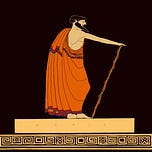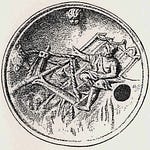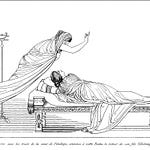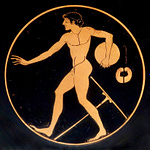Odyssey 4.306-463
There is a great non sequitur in Telemachus plea to Menelaus. When he says “that’s why I’ve come to these your knees,” we expect him to ask for military help to solve the problem of his overrun household. (Peisistratus had earlier made clear his companion’s need for real allies.) At Nestor’s Pylos, there was a whole army camped on the beach, ready to be doing! Yet we never hear this plea from Telemachus, for the aid of manpower, which is surely no more than what the suitors themselves are expecting from Telemachus’ adventure. It will later become clear how pitifully small are the human resources available on Ithaca itself for the scouring of the Shire and the salvation of Toad Hall. No, the plea is for Menelaus to “tell the tale of that man’s grievous obliteration.” He asks for the eyewitness account of his father’s death, whose premise in fact precludes any source of aid for Telemachus’ own predicament.
When he hears about Telemachus’ situation at home, Menelaus wishes that Odysseus would appear “in the shape he was once,” when back on the campaign he won a wrestling match in front of everybody. “In that shape may Odysseus come have a chat with the suitors.” This wish says an awful lot about what is delusional in the human notion of return or restoration or rebirth (νόστος), to which Odysseus and his admirers aspire. If only Joe Biden would tackle Trump the way he did back in 2020. Time, to which Homer never seems to refer abstractly as we do, moves onward inexorably. Everyone and everything move on. Clytemnestra and Helen move on. Is Penelope alone in staying put? No amount of weaving and unweaving can mask the fact of aging, however. Aging is, after all, a motion as well, though not in place. For Odysseus to be of any use nowadays in purging the suitors from his domain, he would therefore have to be, by Menelaus’ tacit admission, a shapeshifter.
In his answer to Telemachus, Menelaus gives us the original shapeshifter, the protean Proteus, the Old Man of the Sea—yet another Aegyptian wonder. Again, men of war are put into situations where their strength, prowess, and weaponry are all but useless. Yet Menelaus describes their ambush of Proteus as their “most terrible … ever.” After all those years of war and lying in wait, this one was the worst: “for it stressed us dreadfully, / The most deadly smell from the seals fed in the brine.” These manly men, the bravest for “every mission,” couldn’t stomach a fishy odour.
The men’s strength and endurance is expressed by their ability, not to tackle or fight their victim, but to keep on squeezing him (πιέζειν) though he changes form and shape. The verb recalls Odysseus ‘squeezing’ (πιέζειν) the throat of the warrior crouched inside the Trojan Horse, who wanted to answer Helen’s seductive call. I suppose it is the strength of a wrestler, to squeeze. But squeezing a throat, or clinging on, are not typical postures of masculine heroism. Although, it must be said, Homer achieves a picture here beyond the reach of Hollywood special effects, or even the logic of the imagination: Proteus turns into water, a liquid incompressible. And yet Menelaus and his men give him a good squeeze, and Proteus does not run through their fingers.
The shape shifter Proteus is a substance shifter; this seems to be one point of his becoming water. And yet he maintains his identity, as something separable from his matter and form. He embodies a germ, a protean germ, for later thinkers’ speculation into ontology and epistemology. Proteus himself performs one action: he counts (ἀριθμεῖν). Why does he do this? Does counting his seals reassure him in some way? Does counting one’s things do this generally? I wanna go out tonight, I wanna find out what I got—Bruce Springsteen.
But Proteus the substance shifter is himself tricked by a mere skin. Things must be sorted, as apples and oranges, before they can be counted. In effect, Proteus only counts appearances—skins—not substances. Have the men invalidated Proteus’ count, or earned their place in it? They have, after all, through the sacrifice of their briny surrogates, attained an audience with the god.
The four seals, for Menelaus and his three men, have been newly flayed. The otherwise charming Eidothea has apparently gone underwater and dispatched and skinned these poor creatures. I am reminded of our first encounter with the suitors, in Book I (108), where they are described as seated on ‘the hides of cattle they themselves killed.’ The skins of things are their appearances, but detached they are also substances which clothe and blanket us. We remember also the opening lines of the poem, where Odysseus’ comrades are said to have lost their return home for killing and eating the cattle of the sun. These solar cattle appear to be the days of a year. It does seem that for Homer, the fact of animal sacrifice is not somehow in the cultural background, a given or assumed thing, but rather a matter much within his consciousness and contemplation.
One presumes that Helius likes to count his cattle, and Proteus his seals, just as we count, name and variously number our days. Both would get extremely upset if any go missing. We ourselves quite absurdly believe in all kinds of dating schemes from various self-styled sciences, and would be very upset if this was not actually the 2,024th year CE, or if the world had never had a beginning (in a ‘big bang’!) or was only a few hundred years old. I shall have more to say about counting and storytelling, but does it not seem that Homer is entertaining an idea here about being counted as well as counting; that there is, behind and beneath all the feasting, and the stealing our days and our time—and our skins—a cosmic reckoner, and a cosmic reckoning?
In Greek:













“Who Would Go To Bed With A Sea Monster?”: Homer in English